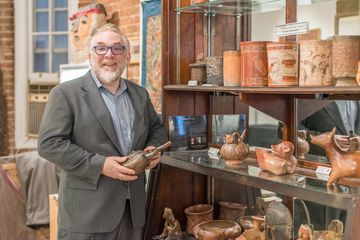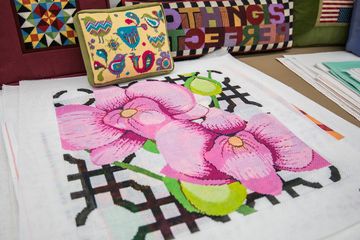When I walked into Book Nook, I thought I had stepped inside a children’s novel. Intrigued, I began to look around at the leafy, artificial vines hanging from the low ceiling like verdant Christmas lights, complementing the trees and birds painted on the walls. I walked by the fireplace in the corner, surrounded by stacks and stacks of colorful books, noticing the paintings, toys, and tiny, pastel-colored models of houses and bicycles adorning the shelves. I asked Rina Patel-Collins, the effervescent young founder, to tell me the story behind Book Nook. To begin with, Rina told me that she believes that designing the space where children learn is as important as what they learn. She carefully created Book Nook’s beautiful interior in order to make sure that “from the moment they walk in, children want to be here. ” I think that she has succeeded: There was something immensely calming about the space that made me want to curl up with a book. Rina led me through the hallway and into a similar room that had bright colors, vibrant and child-friendly décor, paintings, and, of course, rows upon rows of books. It was in here that I found children sitting around small, circular tables, engaged in lively conversation as an instructor shared a picture book with them. Armed with degrees in elementary and early child education, a Master’s in teaching literacy, and a certificate in handwriting education, Rina taught at public schools in New Jersey for many years before she moved to Manhattan and became the director of a pre-school. While she taught pre-k, kindergarten and first grade, she started to zero in on “the gap between each grade. ” She recognized that children have different needs and various styles of learning. “I’ve learned throughout the years that all children are at different levels, even if they are at the same age, ” she said. Even though the idea for Book Nook started brewing during her four years as a pre-school director, the seed for the project was officially planted when Rina began tutoring privately in homes - she realized how beneficial it was that children were learning one-on-one in a home setting. She also noticed that there was a void in the market for an enrichment program that was based in academics, rather than solely in the arts. “Reading is an enrichment, too, and we have to teach children that early on: That it’s not something you do just to learn things, you have to innately love it, ” she passionately explained to me. And so began Book Nook: a one-day-a-week, holistic enrichment program for children from the age of eighteen months to seven years. Rina begins by concentrating on skills such as fine motor development, separation, confidence, and teaching children how to sit at a table and remain focused. By the time they leave the program, they are confident enough to read with proper reading comprehension and write (in both uppercase and lowercase) on their own. Every aspect of the Book Nook program draws from Rina’s in-depth experience teaching young children. There are only five children at a time, and the youngest and oldest members of a group are within six months of each other, in the hopes that they are hitting the same milestones in a similar time-frame. Rina feels that this helps facilitate peer learning. Interestingly, Book Nook has no toys; instead, Rina likes the “wall-to-wall books” ambience, so that children are visually surrounded by a variety of books. “First, children learn to read through pictures, and then they move onto decoding familiar words, ultimately becoming able to read independently, ” Rina said succinctly. “The key is to bridge the gap between the three by providing students with books they’re interested in. ” To this end, Rina provides each parent with carefully handpicked booklists with a combination of new books and classics. When Rina told me that she had made many of the lovely, eclectic little pieces that adorn the walls and shelves of Book Nook, I was amazed. Just when I thought she could not have any more feathers in her cap, it turned out that she was an artist, too! She pointed to one of the walls, which was covered with a grid of small, square paintings, each bearing a letter of the alphabet and a portrait of a corresponding animal: Rina made each painting herself. In front of her office is a large wooden scale, with notches to measure kids’ heights. It was exquisite. I thought for sure that this was store-bought, but Rina assured me with a cheerful shrug, “I didn’t want to spend a $100 on it... so I made it myself! ”As of the Summer of 2016, Rina is looking forward to opening a second location in Tribeca. I asked her how she has the energy to do everything herself, from designing her curriculum and her space to working with the children, and she joked: “I don’t sleep. ” Then she laughed and said that she is so passionate about her job that it never feels like work. “I told myself that whenever I start my own school or business, I’d make it so I’d want to be here all the time, and if I want to be here all the time, then the kids will want to be here all the time. ” Looking around Book Nook, I can confirm that she has achieved her dream.



